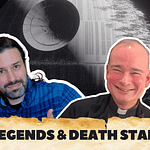Father Roderick (aka the Death Star Chaplain) and Dominic, founder of LegendFiction chat about the upcoming Superman movie, and get into something way bigger: why we need heroes, what makes stories powerful, and how fiction is more than fun—it’s formation.
Why We’re Tired of Sad Superheroes
With James Gunn rebooting Superman, there’s a hope—maybe even a hunger—for something brighter. “We've had a decade of grimdark,” said Father Roderick. “All these superheroes need therapy. They're more broken than the rest of us.”
Back when he first encountered Superman comics in the Netherlands, what struck him wasn't the powers—it was the optimism. Every story was full of wonder. Every villain had a wild plot. And Superman was just good. A guy you'd want to be. Not someone you felt bad for.
Harrison Ford once said, “Fiction is rehearsal.” That landed for Father Roderick. “We don’t watch stories just to escape. We watch to prepare.” Superhero stories show us who we could be. Not because we’ll leap tall buildings—but because we might stand up when it counts.
Dominic added, “Superheroes are stained glass windows. Larger-than-life icons, showing us what we should aim for.” And right now? We’re starved for that vision.
Where Adventure Went—and Why It’s Coming Back
There used to be joy in the journey. Dom brought up The Phantom, a fun Australian favorite hero. Purple suit, jungle missions, heroic vibes. “They all had super-dogs back in the day. Smiles. Banter. You felt like the world was worth saving,” he said.
But something shifted. Stories turned inward. Heroes became icons of critique and sadness. “You don’t stay in the fight when you’re depressed,” Dom pointed out. “You quit. You disappear. You pull a Thor, grow a beer belly, and snark at everything.”
Now, there’s a hint that we’re turning back. Gunn’s Superman might be the start of that turn. A call to joy. A high-water mark for a different kind of hero.
Reading the Signs of the Times (With Pop Culture)
Dom referenced Sister Nancy Usselman, author of Becoming Media Mystics. Her point? If a story catches fire and sticks around, it might be because the Holy Spirit is whispering through it. People build communities around lasting stories for a reason.
What’s the question at the heart of most superhero tales? “If you can do good, should you?” And that’s a spiritual question. The kind we’re starving to explore.
From Cozy to Courageous
We’re seeing a boom in cozy fiction. Teacups. Bookstores. Safety. And there’s nothing wrong with that—it’s a retreat. But Father Roderick challenged us: “Retreat can’t be the only answer. We need adventure stories too.”
Stories where things are hard but worth it. Where danger exists but joy goes with you. Where hope and grit walk hand-in-hand.
Games as Modern Mystical Schools
The talk shifted into gaming. Jedi: Fallen Order. The new Indiana Jones. Assassin’s Creed in VR Venice. These aren’t just games—they might also be immersive spiritual meditations.
“Games today do what mystery schools used to,” Dom mused. “They help us enter an experience and come out changed.”
You don’t just watch a story—you live it. React. Fail. Learn. Grow. And in doing so, games might be our most honest way to spiritually stretch today.
Trauma and Transformation in Storytelling
A viewer asked: How much trauma is too much in character arcs?
Short answer: Enough to earn the ending, not overwhelm it.
Rocket Raccoon in Guardians of the Galaxy was the example. We don’t get his backstory until the third movie—and it hits hard because it’s earned. We’ve laughed with him. We care. And then we understand.
“Don’t dump all the trauma at the start,” Father Roderick said. “Let us meet the character first.”
We all build identities to protect ourselves. But over time, those identities isolate us. “Coping mechanisms become armor,” said Dom. “At some point, it keeps us from real connection.”
Great stories show what happens when the armor breaks. And a real person steps forward.
Balancing Joy and Struggle in Your Protagonist
Another AMA question: Can you have a character asking, “What is God’s will for my life?” without making the whole story depressing?
Yes. People do it all the time.
You balance it. A cheerful exterior might be masking something deeper. That’s real. What matters is the struggle, the ongoing attempt to course-correct.
"Discouragement is a sign it’s not from God," Dom added. “He doesn’t induce despair.”
The duo ended with this image: trying to fly a ship in a game. You overcorrect. You veer off course. Then overcorrect again. That’s life. And that’s storytelling.
We tell stories to test what we might do in real life. We let characters fall apart, fall forward, and find grace. Not because they’re perfect. But because, like us, they’re trying to hit the mark—even if it takes the long way around.
“Think about your last five confessions,” said Dom. “Or your biggest mistakes. You’re not done. And neither are your characters.”
Thanks to everyone who tuned in live! Keep writing. Keep imagining.
Drop your questions in the comments, and we’ll bring them up next Wednesday!










Share this post